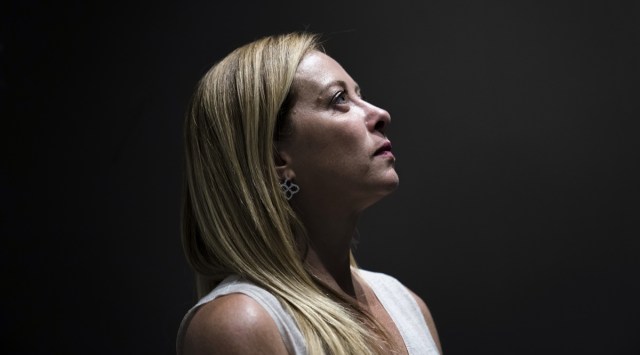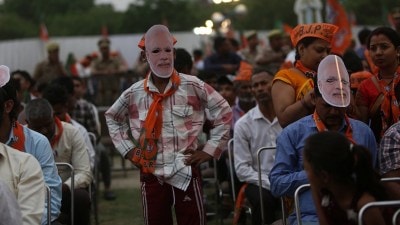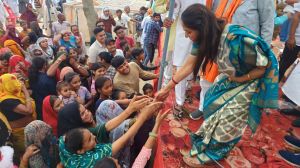- India
- International
Giorgia Meloni could be the first woman to lead Italy. Not all women are happy.
Many women's rights activists fear that Meloni’s hard-right agenda, her talk about preventing abortions, opposing quotas and other measures will set back the cause of women.
 Meloni often talks with pride about how she started the Brothers of Italy party and rose to the top of national politics without any special treatment. (Gianni Cipriano/The New York Times)
Meloni often talks with pride about how she started the Brothers of Italy party and rose to the top of national politics without any special treatment. (Gianni Cipriano/The New York Times)Being a woman, and mother, has been central to the political pitch of Giorgia Meloni, the hard-right politician who is likely to become Italy’s prime minister after elections Sunday.
She once ran for mayor seven months pregnant because she said powerful men had told her she couldn’t. Her most famous speech includes the refrain “I am a woman. I am a mother.” She often talks with pride about how she started a party, Brothers of Italy, and rose to the top of national politics without any special treatment.
But as happy as women’s rights activists are about that fact that a woman could finally run Italy, many wish it was essentially any other woman in Italy. They fear that Meloni’s hard-right agenda, her talk about preventing abortions, opposing quotas and other measures will set back the cause of women.
“It’s not a gain at all and, indeed, a possible setback from the point of view of women’s rights,” said Giorgia Serughetti, who writes about women’s issues and teaches political philosophy at Bicocca University in Milan.
More than in neighboring European Union countries, women in Italy have struggled to emerge in the country’s traditionally patriarchal society. Four out of 10 Italian women don’t work. Unemployment rates are even higher for young women starting careers. Female CEOs lead only a tiny percentage of companies listed on Milan’s stock exchange, and there are fewer than 10 female rectors at Italy’s more than 80 universities.

And for many Italian women, finding a suitable work-life balance becomes nearly impossible once children enter the equation. Affordable, all-day, public child care is nonexistent in many areas, and women paid the highest price during the pandemic, staying home even after periods of lockdown when schools were shut.
All national and international indicators suggest that if women in Italy worked more, gross domestic product would largely benefit and increase.
 Supporters of Giorgia Meloni and the hard-right Brothers of Italy party at a campaign rally in Caligari, Italy, on Sept. 2, 2022. Voters’ main concerns are energy prices, inflation, the cost of living, and Italy’s policy toward Russia and Ukraine. (Gianni Cipriano/The New York Times)
Supporters of Giorgia Meloni and the hard-right Brothers of Italy party at a campaign rally in Caligari, Italy, on Sept. 2, 2022. Voters’ main concerns are energy prices, inflation, the cost of living, and Italy’s policy toward Russia and Ukraine. (Gianni Cipriano/The New York Times)
“Half of Italian women do not have economic independence,” said Linda Laura Sabbadini, a statistician and director of new technologies at Italy’s National Institute of Statistics. “That can’t just be cultural; politics clearly hasn’t done enough for women so far.”
Meloni has presented herself as someone who will help, but on key issues to women, the coalition has been vague and short on details. And a coalition partner, Matteo Salvini of the anti-immigrant League party, has admired Viktor Orban, the conservative prime minister of Hungary, and his family policies. The League’s leader recently said that Orban had drafted the “most advanced family policy” giving “the best results at the European level.”
Orban has encouraged Hungarian mothers to procreate prolifically to counter the dropping birthrate. This month, the Hungarian government passed a decree that would require women seeking an abortion to observe fetal vital signs before moving forward with the procedure.
Concerns have emerged in Italy that Meloni’s center-right coalition could make it harder for women to have abortions in a country where the procedure has been legal since 1978 but is still very difficult to obtain.
Asked about the law, Meloni, who has said her mother nearly aborted her, vowed in an interview that she “wouldn’t change it” as prime minister and that abortion would remain “accessible and safe and legal.” But she added that she wanted to more fully apply a part of the law “about prevention,” which, she said, had been effectively ignored until now.
Critics fear that the approach would allow anti-abortion organizations to play a more prominent role in family-planning clinics and encourage even more doctors to avoid the procedure. Only about 33% of doctors perform legal abortions in Italy, and even less, 10%, in some regions.
Laura Lattuada, an actress in Rome, said she was concerned that the abortion law could be chipped away with Meloni in power.
“She’s constantly saying she wants to improve it, but I am not sure that her conception of protecting women and the family corresponds to the improvement of women’s rights,” she said.
Abortion is hardly the only issue that has given activists pause. Italy introduced and has progressively extended the so-called pink quotas, a mandated percentage of female representation in politics and boardrooms. Many women say quotas in politics better reflect the population, while quotas in companies help overcome “old boys” networks, giving women equal access to higher paying jobs. They also give women greater visibility, they said.
Meloni is against the quotas. She argues that as a woman, she climbed the political ladder on her own and is now poised to run the country. She said that she is proof that women don’t need government interference to enforce diversity.
Her supporters agreed.
“They never gave her anything; she took it. She won on her own,” said Lucia Loddo, 54, who was waving a banner supporting Meloni at a rally in Cagliari. She said that for women, Meloni’s ascent “is the most beautiful thing. All of the men have been disasters. She is prepared.”
About 25% of Italian woman voting Sunday are expected to cast their ballots for Meloni, though pollsters failed to ask women whether her gender was a factor in their vote, which is itself telling of the attention given to women voters here. Meloni is polling at least 25% nationally, the highest of any candidate.
Meloni has won voters over with her down-to-earth and straight-talking manner (she often speaks in Roman dialect). But the secret to her popularity has less to do with her personality or policy proposals than that she was essentially the lone leader of a major party to stay in the opposition during the national unity government of Mario Draghi.
That allowed her to campaign in a country that is perennially looking for someone new as a fresh face, even though she has been in Parliament for nearly two decades and was a minister in a past government.
In that time, Italy has had a lackluster track record in empowering women in the workforce, and experts say something else needs to be done.
“We have to create the conditions for employment because we are at the bottom of the list in Europe,” said Ida Maggi of Stati Generali delle Donne, an association working to get women’s issues on the electoral agenda. It makes Italy “look bad,” she said.
One area where Meloni and even her most committed critics agree is the need for more nursery schools. The government of Draghi last year allocated billions of euros to build nurseries and extend child care services. But the problem is by no means solved.
In many Italian regions, a shortage of free nursery schools along with short school days and three-month vacations make it difficult for working mothers to juggle their schedules. Even though many women are staying at home, the country has one of the lowest birthrates in Europe, something Meloni’s center-right coalition has pledged to redress.
Speaking to supporters in Milan this month, Meloni said that she and her allies would work toward getting free child care services, part of “a huge plan to boost the birthrate, to support motherhood.” With only 400,000 births last year, Italy was going through more than a demographic winter, she said: “It’s an ice age.”
“I don’t want this nation to disappear,” she said, adding that the problem should not be solved through immigration. “I want our families to have children,” she added, to a roar of applause.
But critics are not convinced her party, or likely coalition, is entirely committed to the cause of women.
Polls carried out last year show that while the majority of Italians said more should be done to reach gender equality, those numbers were considerably lower among supporters of Brothers of Italy and the League.
One campaign video for a candidate from the Forza Italia party, another coalition ally, was roundly mocked for promising a salary to women who don’t work outside the home. The party is led by Silvio Berlusconi, who, Meloni said in the interview, put her “in difficulty as a woman” with his sex scandals when she was a young minister in his government.
After decades of unfulfilled campaign promises, there is skepticism writ large that any of the parties will really champion women’s causes.
Promises about “the needs and priorities of women” — including free day care and subsidies for families — tend to vanish once it’s time to actually put measures in place, said Laura Moschini, whose organization, the Gender Interuniversity Observatory, has drafted a “handbook for good government” highlighting women’s concerns.
Those issues have discouraged women from voting, and the possibility of electing Meloni as the first female prime minister is not motivating women. Heading into the election Sunday, polls suggest that more than one-third of Italian women probably won’t vote.
“I’m disgusted by the entire political system,” said Laura Porrega, who described herself as a “desperate housewife” because she wasn’t able to find a job. “When they want your taxes, they remember your name, but I’ve gotten nothing from the country at all,” she said.
Serughetti, the Bicocca professor, said that women “don’t see their interests being represented,” so they’d rather abstain.
“The decision of women not to vote is a sort of protest to this order of things,” she said.
Apr 25: Latest News
- 01
- 02
- 03
- 04
- 05








































